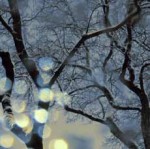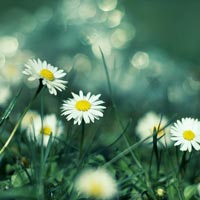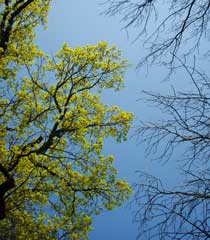Now spring unfurls, and my awareness of my mother’s absence from the living blooming world is acute. The tulips pushing valiantly through the mulch, the budding out of ash trees and lilacs and weigela, the boy robins strutting their orange blaze, the young cardinals flashing crimson in the arborvitae. That the world is coming alive without my mother anywhere in it feels deeply disorienting and impossibly sad.
I think of the rambunctious, kidney-shaped patch of garden my mother tended; her pride and joy over decades of springs and summers. The few brown petals and yellowed bits of stem that now remain of her zigzagged rows of zinnias and black-eyed susans; the weeds and rabbits that have taken over where her feathery cosmos and festive nasturtiums grew.
My petite mother in her ancient floral pedal pushers and a sleeveless rose-colored blouse, kneeling in the dirt of her garden on a sunny spring afternoon, cursing the rabbits that had nibbled her sweet william to nubs. Her hands pressing marigolds into the soil, clasped around the tiny green seedlings as though in prayer.
My mother perched on the backstep before dinner with her juice glass of chablis and a book on her lap, her cigarette smoke drifting toward the three o’clocks and bleeding hearts.
Here in the city where I live, the lilacs along my fence are budding. Another pang, a toll of the bell, a thought of my mother, a picture. The purple lilac bushes she loved; she’d reach on tiptoes to snip off giant bunches of blooms to place in a gilded floral porcelain vase that had been her grandmother’s. The large red rosebushes she loved, the spreading crabapple trees she loved, the trumpets of nicotinia flowers she loved. Her affection for fluffy bachelor buttons and oddball snapdragons. The petunia and geranium plants her fingers pushed every year into large clay planters, plunking in cheerful windspinners and even a gnome on a stick for good measure. The delight she took from garden-fresh tomatoes. The vases of daisies always on her table.
My mother is dead. I realize it over and over again. When will I become inured to the shock of it? When will I just know it? When will it feel normal that I am here but that my mother is nowhere in the world, that the trees have come from dormancy to bud again but that my mother has simply ceased to exist?
Yet I know that’s not the end of it. Faith, broadly speaking; transcendent knowledge. The life of the spirit, chi, the new physics, old poetry, Melody’s universal sea of energy. My mother has departed her body, her hands won’t press cosmos into the earth. But perhaps in some manner or form she is still beholding robins and taking pleasure in lilacs. Is that possible? I don’t know where she is. The indestructible energy of her, the electromagnetic essence of her, the enduring spirit of her. Yes. But all of a piece? Free floating? Reincarnated?
Since her death, she has come to me clearly just once, the night after she died. It was near midnight; I was returning from a dinner out with friends, where I’d recounted the stories of my mother’s dying within the warm cocoon of attentive friendship and mellow wine and ravioli tossed with butternut squash. I hadn’t slept in 24 hours, although my midnight trip to claim my mother’s dead body seemed to have happened a very long time ago.
In the yellow streetlight glow along our alley, A. was nosing the car toward the door of our small garage. That’s when it happened. It was sudden and startling. I felt and sensed my mother’s presence just behind my left shoulder, almost as though she were leaning forward from the middle of the backseat. It was an intense physical presence that vibrated with warmth; it felt so substantial and real and profound that every nerve in me quivered.
How to really capture what I felt without sliding into hackneyed phrases or pure pablum, without evoking the slushy bathos of a movie on the Hallmark channel? I’m not sure it’s possible. The uncanny feeling of a radiating warmth, the sense of space highly charged and fully occupied, though nothing material could be seen there. The overpowering sense of my mother, of her essence; of a wavelength and an embrace. The love I felt. The absolutely certain understanding that she had arrived in some new form or place, been transmuted, was healed and in an essential way whole. The sense that she saw things whole as well, knew the truth of things. A sense of peace, but the vibe was not static; it felt somehow generative, creative.
It wasn’t Jesus I saw that night, of that I’m certain. I wasn’t filled with the holy spirit, wasn’t born again, won’t be speaking in tongues or working my grandmother’s rosary beads. Maybe, as my endlessly astonishing Lutheran seminarian grief counselor later suggested, my emotional and physical exhaustion had left my conscious mind uncharacteristically unguarded, open to the blurry, the extrasensory, even the mystical. The place at sleep’s edge can be like that, she said; can be a gateway to realms that lie beyond the ken of the everyday rational mind.
What I know for sure is that I did have the extraordinary feeling of being in the presence of my mother, or her essence, some 12 hours after she was released from her suffering body. Figment of my imagination? I can’t be entirely certain, of course—the freshness of my mother’s death, after all; my extreme fatigue, the warmth of the dinner with friends, the buzz of the wine. But the warmth and weight of my mother’s presence seemed palpable. “My mother’s here,” I said to A. in a strangled whisper. “Oh, do you feel her with you?” A. said. “No,” I whispered, “I mean she’s really here. Right here.”
She departed more gradually than she had come, staying with me into the house, finally ebbing away as I hung up my coat and walked toward the kitchen. But the warmth of her visit is with me still. It imparted a sense of peace that, again, is difficult to describe short of hackneyed sputterings. I will only say that my sense of connection with my mother was deepened by the experience, adding only that it led to me believe that my mother will continue to be present in my life, perhaps in powerful—and empowering—ways. I hope this is true. I don’t pretend to understand all of it yet. If this sounds hackneyed, so be it. It’s what happened. Maybe in time I can find a richer way of writing about it.
There’s a coda to this story of spring and my mother. Yesterday, as A. and I headed out for a walk, a bit of white caught my eye amid the Rosy Glow barberries and Wilton junipers and Stella D’Oro lillies I’d planted on a slope alongside the front steps. Litter, I thought; I reached to pluck it from beneath the greening plants. But it wasn’t litter. It was, in slightly weathered form, the small folded program from my mother’s funeral, with its poems of hope and renewal. I staggered, flabbergasted. Neither A. nor I could imagine how it had come to be there. Presumably a copy had flown out of a pocket or purse as we returned from my mother’s burial on February 2, and had since lain there under the snow. That’s the only plausible theory.
But of course plausibility is far from the point. This sign. My mother had come to me again, left a sign for me amid the budding and greening of spring in this frontyard garden of my own making. She’d chosen an apt calling card, the program with the poem I’d chosen for its lyrical promise that my mother would be more easily found after death in blooming flowers than in a grave.
Again I fear descending into Hallmark schmaltz; so decidedly not my style. This is not a story of grief wrapped up with a bow or an Oprah-ready parable of grief and redemption. It is not a tale of how I saw the Virgin Mary on the head of a tulip or my mother winking Kumbaya in morse code from the eyes of a chickadee.
But the inexplicability of it. Not just any errant scrap of paper, but the card from my mother’s funeral. Landing where it did. What are the odds? The thrilling mystery of it, the heartening joy of it. I do savor it. I carry the knowledge of it—the day my mother blew in to the yard—like an amulet, something to wield against the acuteness of my grief as the world bursts into spring for the first time in my lifetime without my mother in the world . . . or not as the person she was, the bright slangy brimming mother I loved and felt loved by, the avid gardener with a juice glass of wine and a good book and dirt under her fingernails.
My mother died barely 8 weeks ago. Tonight found me at a gathering where no one thought once to mention my mother or even to ask me how I was doing. How is that possible, I thought? The sadness I felt. My mother so alive to me still but so quickly vanished from the everyday world.
My first spring without her. She left me signs. I look for more. I move on as best I can.
———-
The lovely poem, by Mary Elizabeth Frye (1932), that I printed on my mother’s funeral card.
Do Not Stand at My Grave and Weep
Do not stand at my grave and weep,
I am not there, I do not sleep.
I am in a thousand winds that blow,
I am the softly falling snow.
I am the gentle showers of rain,
I am the fields of ripening grain.
I am in the morning hush,
I am in the graceful rush
Of beautiful birds in circling flight,
I am the starshine of the night.
I am in the flowers that bloom,
I am in a quiet room.
I am in the birds that sing,
I am in each lovely thing.
Do not stand at my grave and cry,
I am not there. I do not die.
Hear it: A beautiful musical version of this poem is available
as a free download from Irish folksinger Shaz Oye.






